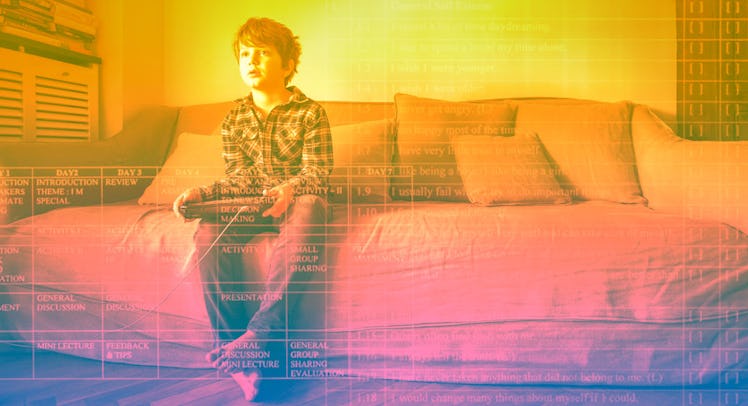When Can Parents Finally Leave A Kid Home Alone?
Common sense tells us that infants should never be left unattended, and that 16-year-olds are probably fine on their own. It’s the grey area in between that troubles parents.

Common sense tells us that infants should never be left unattended and that 16-year-olds are probably just fine on their own. But the years between infancy and self-sufficiency are confusing t0 parents. Can I leave my 8-year-old home alone unattended for an hour? Can I leave my 5-year-old in the car while I zip into the supermarket? Is my 12-year-old ready for an overnight without me?
There are several factors to consider before leaving your children unattended, including local laws, the overall safety of the location, and whether your kids are anything like Kevin McCallister. Here are some questions to ask before handing your child the keys to the house:
The Legal Question
Parents can get into quite a bit of legal trouble for leaving their children unattended. If a nosy neighbor reports you for leaving your child home alone at too tender an age, Child Protective Services may open an investigation and even recommend that you lose custody.
But even most states aren’t sure how young is too young. Only three states have laws regarding the minimum age that a parent may leave a child home alone: Maryland at 8, Oregon at 10, and Illinois at 14. Several states and organizations offer guidelines, but they have similarly frustrating age ranges. Kansas, Nebraska, Georgia, and North Dakota recommend parents wait until their children are 6, 7, 8, and 9, respectively. Tennessee, Washington, and the organization Kids Health think 10 is the magic number; Michigan and Virginia suspect it’s closer to 11. Colorado, Delaware, Mississippi, and the organization Prevent Child Abuse suggest you wait until age 12.
Lawyers who specialize in negligence claims say leaving a child under the age of 7 unattended for any amount of time is asking for legal trouble. And until age 12, it’s legally risky in many states to leave your children alone for more than an hour or two, especially late at night.
The Maturity Question
Obviously it’s not all about age. There are some mature 8-year-olds out there, and plenty of adolescents who shouldn’t be left unsupervised. So after you’ve established that it’s legal to leave your kid home alone, it’s time to ask a more subtle question: is your child mature enough?
The U.S. Department of Health and Human Services suggests that parents determine a child’s maturity by asking whether the child obeys rules, makes good decisions, and responds well to unfamiliar or stressful situations. There are also more scientific ways to determine maturity. Researchers who are studying emotional intelligence usually rely on the 48-question Emotional Maturity Scale, developed in 1984 by psychologists Yashvir Singh and Mahesh Bhargave. If your child scores high on this test, this may indicate that he or she is ready to be home alone.
The Contingency Question
Even a very mature child does not necessarily know what to do in a crisis. So before you leave your child unattended, it’s your responsibility to ensure that he or she has the information to make mature decisions when you’re not around. First and foremost, your child needs to know who to contact in an emergency. Try running realistic scenarios with your child and, even then, make sure that the basic phone numbers and information they may need are written down and easily accessible. Knowledge of basic first aid and CPR never hurts — the Red Cross, for instance, offers safety courses that can familiarize your child with emergency procedures.
The Childproofing Question
This may seem unnecessary, given that you’ve already ensured that your child is mature enough to be home alone, but even adults make poor decisions and it helps if poor decisions are less accessible when you’re away. Before you leave your child home alone, make sure to lock up any alcohol, tobacco, lighters or matches, medications, weapons, and car keys.
Aside from hiding vices from your kids, you’ll also want to make sure that your house is prepared with everyday and emergency supplies. Before you leave your kid home alone for even a short amount of time, stock the pantries with snacks, leave flashlights in clear view in case of a power outage, and post important phone numbers on the refrigerator.
The Common Sense … Thing
Even if you adequately prepare the house, run psychometric tests on your kids, and cover all your legal bases, there are simply some situations in which it is not wise to leave your children unattended. So before you run out the door, take a beat for a sanity check.
Ask yourself: how safe is your neighborhood? How many children are being left alone together, and do they generally interact well with one another? Does your child have any developmental or physical challenges, that call into question his or her ability to get by without you around? As a rule, if your child doesn’t feel ready to be left alone, he or she is not ready. And if you don’t feel ready to leave him or her alone, that’s a good sign that you may want to recheck this list.
This article was originally published on